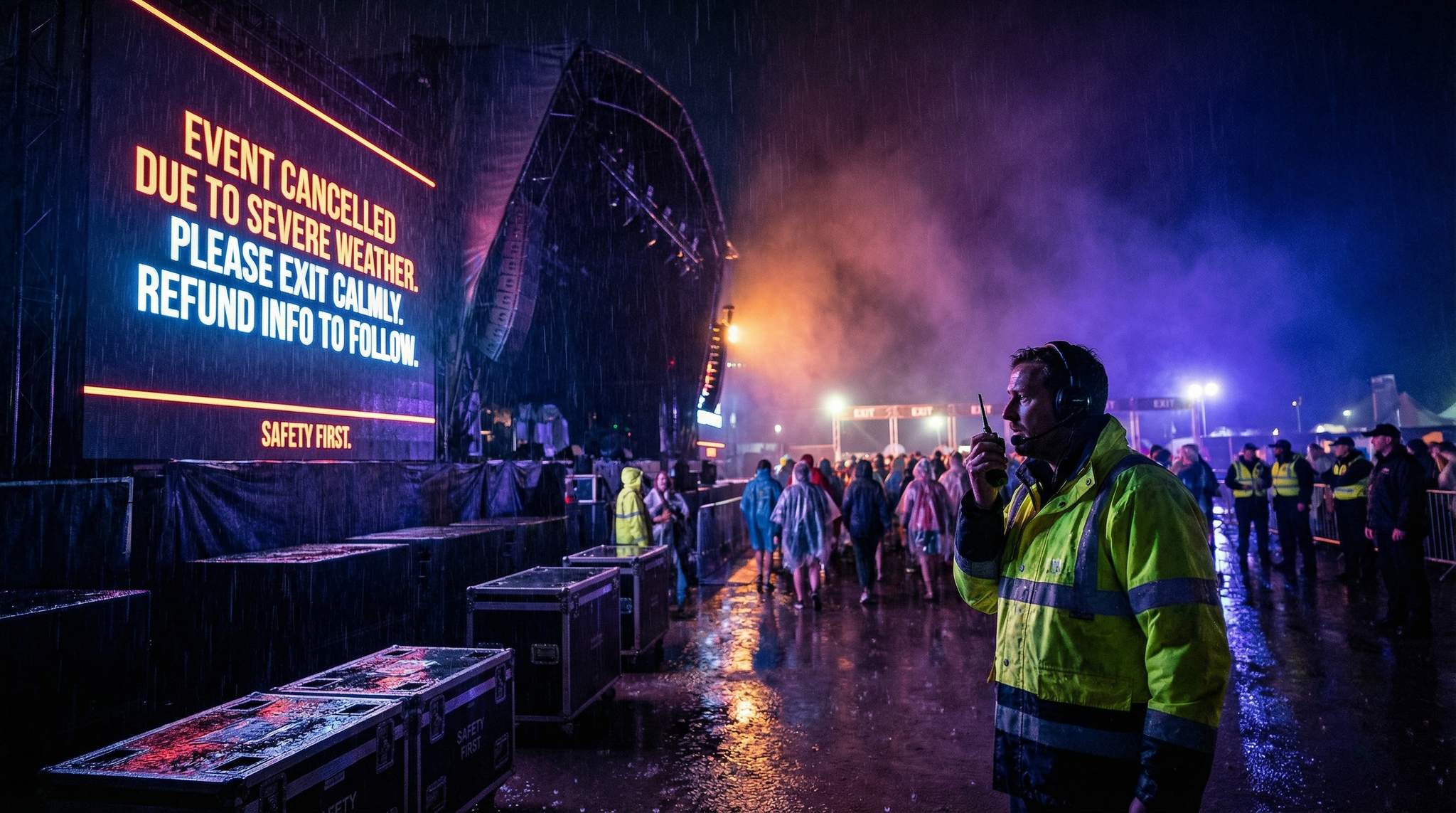Festivals thrive on excitement and anticipation, but seasoned organizers know that unforeseen events – from sudden extreme weather to security threats – can halt the festivities in an instant. Every festival, whether a small local gathering or a massive international event, needs a solid cancellation and refund protocol as a cornerstone of its risk management plan. Having a clear strategy for worst-case scenarios ensures that if the show must stop, it does so safely, with attendees informed and the organization protected. Below is an outline of how veteran producers approach the tough decision to cancel, how to communicate it effectively, refund and insurance considerations, and the logistics of shutting down in an orderly way.
Deciding When to Cancel
Cancelling a festival is always a last resort, but safety should always trump the show. Experienced festival teams establish clear criteria for when to call off or interrupt an event. For weather-related threats, this means setting predefined thresholds – for example, if lightning is detected within a certain radius or winds exceed a safe speed, or if heavy rain renders key areas unsafe. Organizers consult with meteorologists or use professional weather alert services to receive real-time updates. They also coordinate closely with local authorities and emergency services when making the decision. In many cases, input from authorities (such as police or fire departments) is crucial – for instance, if there’s a credible security threat or a mandated evacuation, officials will advise or even direct an event shutdown. A well-defined chain of command is established in advance: festival directors, safety officers, and local officials should know who has the authority to make the cancellation call and under what conditions.
Importantly, timing is everything. Cancel too early and attendees might be disappointed needlessly; cancel too late and the outcome could be chaos or harm. Veteran producers emphasize early warnings and contingency plans. If extreme weather is forecast hours or days out, it may be safer to cancel or postpone before guests arrive en masse. In 2011, several concerts learned this the hard way when stages collapsed in high winds – underlining that it’s better to err on the side of caution. On the other hand, short interruptions can sometimes save an event day: pausing performances and urging attendees to seek shelter during a passing storm, then resuming if conditions improve, is often preferable to outright cancellation. The key is having those protocols in writing and practiced. Tabletop exercises or drills with staff can be invaluable so that everyone knows their role if a shutdown becomes necessary.
Communication: Informing Attendees and Stakeholders
Once the difficult decision to cancel or pause a festival is made, clear and immediate communication is the next priority. How organizers convey the news can make all the difference in maintaining order and preserving trust.
No Hidden Fees, Just Honest Pricing
One all-inclusive fee covers the platform, payment processing, support, and every feature. Free events are always free. No setup costs, no surprises.
On-Site Announcements and Crowd Management
For attendees already on location, announcements must be prompt, calm, and instructive. Many large festivals use stage MCs or audio public-address systems to broadcast emergency messages. Visual cues help too – electronic screens and signage can display evacuation instructions or important updates. The messaging should be concise and direct: for example, advising people to move to specific exits or shelter areas, and informing them of the reason (e.g. “Due to approaching severe weather, we are temporarily evacuating the festival grounds. Please remain calm and proceed to the exit gates as directed.”). An example of effective communication occurred at a major European rock festival that was evacuated due to a security concern – organizers asked tens of thousands of fans to leave calmly and indicated optimism about resuming the event once it was deemed safe, a strategy highlighted when German police ordered a rock festival evacuation over a terror threat. This approach avoided panic, as attendees understood the situation was being managed and that updates would follow.
Frontline staff and volunteers play a critical role here. Festival crews should be stationed at exit points and throughout the venue to guide the crowd, answer questions, and assist anyone needing help. High-visibility vests and megaphones or portable loudspeakers can help staff get attendees’ attention even if power is cut. It’s wise to train the team in basic crowd management and emergency procedures so they project confidence and keep people moving in the right direction. For multi-stage or large sites, coordinated messaging is vital – all stages and areas should communicate the same instructions simultaneously to avoid confusion. Additionally, consider special accommodations: if the crowd includes families, children, or persons with disabilities, ensure there are plans to assist those groups in an evacuation (such as dedicated staff for a family reunification point or mobility assistance).
Planning a Festival?
Ticket Fairy's festival ticketing platform handles multi-day passes, RFID wristbands, and complex festival operations.
Remote Communication to Off-Site Attendees
While on-site announcements are happening, another communication team should rapidly inform those not yet at the festival or those following remotely. Social media channels (Facebook, Twitter, Instagram) should post official cancellation notices as soon as possible, with a brief explanation and reassurance about next steps (like “safety of our attendees is our top priority”). The festival’s website should have a prominent alert on the homepage with the same information. Many seasoned organizers draft template messages in advance for various scenarios (weather, security, etc.) – this saves precious minutes during an actual emergency.
Email and text message blasts to ticket holders are also highly effective for reaching attendees who may be en route to the venue. Modern ticketing platforms, like The Ticket Fairy, allow promoters to quickly send SMS updates to all ticket buyers. Use these tools to advise people to stay home or turn back if the event is canceled mid-stream. Moreover, coordinate with local media and authorities: local radio or news stations can help spread the word to those who might not check their phones while traveling. The tone of all communications, whether onsite or online, should strike a balance between urgency and reassurance. Let people know what happened (in brief), that their safety comes first, and that more information (such as refund details) will be forthcoming.
Refund Policies and Insurance Considerations
Shutting down a festival has significant financial and reputational implications. A clear refund policy is essential to manage attendee expectations and maintain goodwill. Organizers should spell out their refund terms in the ticket purchase agreement well in advance. Typically, if a festival is completely canceled (and no makeup dates are provided), ticket holders are entitled to a full or substantial refund of the face value of their tickets. For example, when a major U.S. festival’s final day was canceled due to extreme weather, the promoters offered full refunds to all Sunday-only ticketholders, including refunding service fees, as seen when TomorrowWorld organizers offered refunds after bad weather disrupted the final day. Providing refunds even for processing fees shows attendees that the festival is acting in good faith. In cases where an event is partially delivered (say one day of a three-day festival gets washed out), organizers might offer a partial refund or a credit toward a future event. The approach can vary – some events might have a clause that “tickets are non-refundable in case of weather or force majeure,” but even then, many experienced organizers opt to offer something back to customers as a gesture of goodwill and to protect the festival’s long-term reputation.
It’s important to communicate refund instructions clearly and promptly after a cancellation. Let attendees know how and when they will receive their money back, and who to contact with questions. Ideally, if tickets were sold online, the refund can be processed automatically back to customers’ credit cards or accounts to simplify the process. If an event is postponed rather than canceled, ticket buyers should be informed that their tickets will be valid for the new date, or be given an option to request a refund if they cannot attend the rescheduled show. Transparency is key: a brief FAQ on the festival website addressing common concerns (Will vendors or onsite purchases be refunded? What about camping or VIP upgrades? etc.) can help manage the influx of queries.
Accept Payments Across 8 Global Markets
Local currency processing in the US, UK, Canada, Australia, New Zealand, India, Indonesia, and Mexico with region-specific payment methods.
On the organizer’s side, event cancellation insurance is a critical safety net. This specialized insurance can compensate the festival for lost income or unrecoverable costs if the event is called off due to circumstances beyond the organizers’ control (such as severe weather, natural disasters, or other covered perils). There are even policies tailored for adverse weather that cover specific scenarios like rainouts, lightning, high winds, or extreme heat. However, veteran producers warn that one must read the fine print. Not all situations are covered – for instance, many standard policies now exclude pandemics or certain “acts of God.” Additionally, insurers might deny claims if they determine an organizer failed to take reasonable precautions or didn’t adhere to permit requirements. In fact, some local authorities have begun requiring proof of cancellation insurance as a condition of event licensing. For instance, festival organizers must bolster adverse weather plans amid increased insurance scrutiny, reflecting how essential this coverage has become in the festival industry. Organizers should work with insurance experts to get the right coverage mix (cancellation, weather, liability, etc.), and to understand the claims process. If a claim ever needs to be filed, meticulous documentation – weather reports, official evacuation orders, expense records – will help speed up the payout. Ultimately, having insurance won’t prevent the heartbreak of canceling an event, but it can be the difference between surviving to plan another festival and facing financial ruin.
Shutting Down Safely and Orderly
Executing a safe shutdown under pressure is a true test of an organizer’s preparation. A comprehensive cancellation protocol includes the logistics of evacuating or closing the venue without incident. First and foremost, crowd safety is the priority: plans should designate multiple exit routes and muster points so that large volumes of people can leave without bottlenecks. For example, at one large U.S. festival where storms threatened, gates around the perimeter were swung open and attendees were directed to shelter in nearby parking garages and transit stations – keeping tens of thousands of people out of harm’s way. Festival management should coordinate with local police and traffic officials to manage the flow of people and vehicles leaving the site. This might include temporarily closing roads or re-routing traffic, and having buses on standby if public transport is needed to move attendees quickly.
Need Festival Funding?
Get the capital you need to book headliners, secure venues, and scale your festival production.
As attendees are exiting, the festival operations team has a checklist of tasks. Power to stages and non-essential equipment may be shut off to prevent electrical accidents (especially if there’s risk of flooding or lightning). Pyrotechnics or gas-powered equipment should be secured. If high winds are a threat, securing loose structures like tents, signage, and inflatable decorations becomes critical to avoid debris blowing into crowds. Vendors and concessionaires should have been briefed in advance on what to do in an emergency – such as safely closing their booths, protecting cash boxes, and when it’s okay for them to leave their spot. It’s wise to keep key personnel (security, medical teams, and a skeleton crew of managers) on-site until the crowd is mostly evacuated, to handle any medical emergencies or unexpected issues during the exit.
For festivals with campgrounds or multi-day setups, an interruption might not mean patrons immediately leave the property. In cases of severe weather, the safest move might be to have attendees shelter in place (in their cars or a solid structure) until conditions improve, rather than trying to leave all at once on potentially unsafe roads. Organizers should therefore include plans for emergency shelter, communications in campsites (like mobile PA systems or patrols with bullhorns informing campers), and distribution of essentials like water or ponchos if people have to hunker down. After the immediate threat passes or if a cancellation is final, then an organized departure from camping areas can be arranged in daylight if possible. An example of thoughtful on-site crisis management happened at a desert arts festival when an unusual downpour turned the site to mud: the organizers halted entry and programming, communicated for attendees to conserve supplies, and methodically coordinated an exit once roads became passable the next day. This kind of calm, stepwise approach can prevent injuries and panic in extraordinary situations.
Finally, once attendees are safe and the site is mostly clear, there’s the aftermath to manage. The production crew might need to continue tear-down under challenging conditions – often prioritizing the most hazardous structures first (like partially built stages or rigging in high winds). Documentation is also important at this stage: conduct a debrief with key staff and take notes on what went right or wrong in the cancellation process. These lessons learned will feed into improving protocols for the next event. Additionally, if there’s damage to the venue or equipment, or if anyone was injured, those details need logging for insurance and legal purposes. And don’t forget communications post-event: follow up with attendees, artists, and vendors to express regret for the cancellation but gratitude for their cooperation, and assure them that better days are ahead. Handling a shutdown gracefully can actually earn respect – fans and partners will remember that the organizers put safety first and managed a crisis transparently.
Frequently Asked Questions
How do festival organizers decide when to cancel an event?
Organizers establish clear criteria and predefined thresholds for weather or security threats, such as lightning radius or unsafe wind speeds. They consult real-time updates from meteorologists and coordinate with local authorities like police or fire departments. A pre-established chain of command ensures the decision is made by authorized directors or safety officers.
How should festivals communicate a cancellation to attendees?
Effective communication involves immediate, calm announcements via stage MCs and visual screens for on-site crowds, directing them to exits or shelter. Simultaneously, remote teams should post official notices on social media and send SMS or email blasts to ticket holders. The messaging must be concise, explaining the reason and prioritizing safety.
Are festival tickets refundable if an event is canceled due to weather?
Ticket holders are typically entitled to a full or substantial refund of the face value if a festival is completely canceled without makeup dates. For partial cancellations, organizers may offer partial refunds or credits. Providing refunds, including service fees, helps maintain goodwill and protects the event’s long-term reputation with fans.
What does festival cancellation insurance cover?
Event cancellation insurance compensates for lost income and unrecoverable costs when an event is called off due to uncontrollable circumstances like severe weather or natural disasters. Policies can cover specific perils like rainouts or high winds, though organizers must check for exclusions such as pandemics or failure to meet permit requirements.
How do festivals ensure safety during an emergency evacuation?
Safety plans designate multiple exit routes and muster points to prevent bottlenecks while staff guide crowds using high-visibility vests and megaphones. Logistics include shutting off power to stages, securing loose structures like tents, and coordinating with local traffic officials. In some weather scenarios, attendees may be directed to shelter in place rather than leave immediately.
Why is early timing important for festival cancellations?
Canceling or postponing before guests arrive is safer than a mid-event shutdown if extreme weather is forecast hours or days in advance. Early warnings prevent chaos and potential harm associated with evacuating large crowds. However, short interruptions are sometimes preferable to outright cancellation if a storm is expected to pass quickly.





